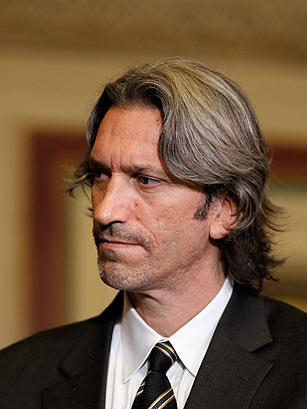
Human Rights Activist John Prendergast (profile photo).
The Minister of Information Michael Makuei on Wednesday dismissed The Sentry’s report implicating the first family, and instead, termed it a corrupt entity.
In its latest report on corruption, The Sentry has linked members of the first family as beneficiaries of a looting scheme involving briefcase investment companies operating in South Sudan.
The three-year investigation into the letters of credit program found that multi-million-dollar contracts were awarded to foreign-run companies, some of which are believed to only existing on paper.
The report found that the children, nieces, and nephews of the President have shares in at least five companies that received millions from credit-backed contracts.
Commenting on the report, the government’s spokesperson, Michael Makuei says The Sentry is “fighting us because we failed to give them something”.
“They [The Sentry] are even corrupt by themselves. They are only fighting us because when they were beginning with us and they wanted us to give them something,” said Makuei.
“When we fail to give them what they want, khalaas[then], they turn against us. This is what we know about this Sentry. Anyway let the document be brought to us, we will respond.”
According to the Sentry, multiple individuals exposed for profiting in the complex scheme continue to receive government contracts.
“In South Sudan, opportunities to do a great deal of good are turned into a license to steal by President Kiir and his inner circle,” said Debra Laprevotte, Senior Investigator at the Sentry.
“Those involved in this billion-dollar scheme hijacked the ministry in control of the nation’s most valuable resource, mortgaged the economic future of the nation, then simply grabbed the cash for themselves.”
The investigation also indicated that a report on the letters of credit program by the auditor-general of South Sudan was presented to President Salva Kiir and the South Sudanese parliament in 2015 but was never made public.
“No action was taken, and no one was brought to justice or held accountable for the program’s failures—legally or politically,” said the rights group.
“The auditor general’s report, reviewed by The Sentry as part of its investigation, shows that the disbursement process developed into a confusing, disjointed system that corrupt actors circumvented or subverted,” it added in the report.
The report titled “Cash Grab” is also centered on how the Central Bank signed several credit facility arrangements with the Qatari government-owned Qatar National Bank and CfC Stanbic, a subsidiary of South Africa’s Standard Bank Group.
The agreements, the Sentry says, allowed South Sudan to borrow $993 million in lines of credit: $793 million from QNB and $200 million from CfC Stanbic.
The Sentry also said it found out that credit lines were supposed to be repaid through the oil production that the country was hoping to resume shortly.
According to documents reviewed in the investigation, businesses with connections to the ruling class, including President Salva Kiir’s family, the then-governor of the central bank Kornelio Koriom, were among those that received contracts worth tens of millions of dollars.
It further said military officials were among those that received contracts collectively worth tens of millions of dollars under the program.
The Central Bank’s “ineffective due diligence in providing the credit facilities, coupled with the government’s lack of transparency and capacity” failed the people of South Sudan, the Sentry noted.
“Almost $1 billion effectively walked out of the country, and the human cost remains to be calculated. At the peak of the letters of credit program, when hundreds of millions of dollars in goods should have arrived in markets.”
“More than two million people went without food, hospitals and clinics had to treat patients without medicine, and fuel shortages resulted in black market price gouging.”
Support Eye Radio, the first independent radio broadcaster of news, information & entertainment in South Sudan.
Make a monthly or a one off contribution.
Copyright 2024. All rights reserved. Eye Radio is a product of Eye Media Limited.